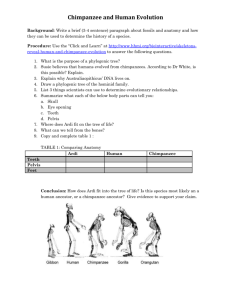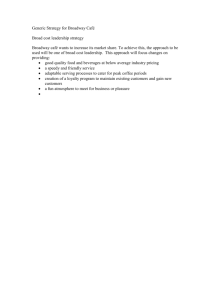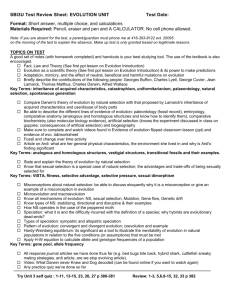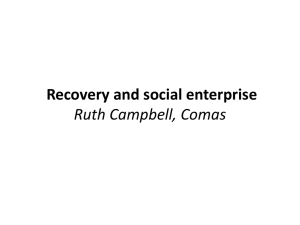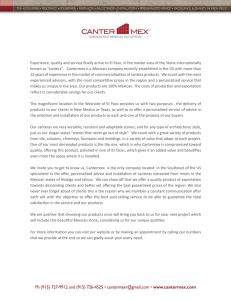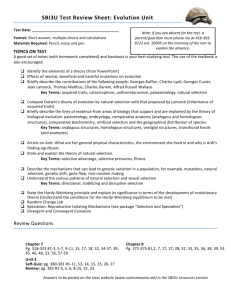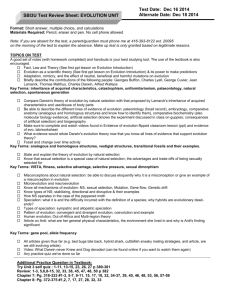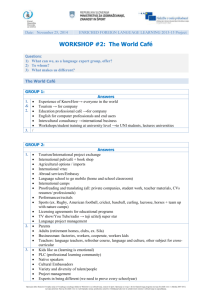Anai-Acoke business plan
advertisement
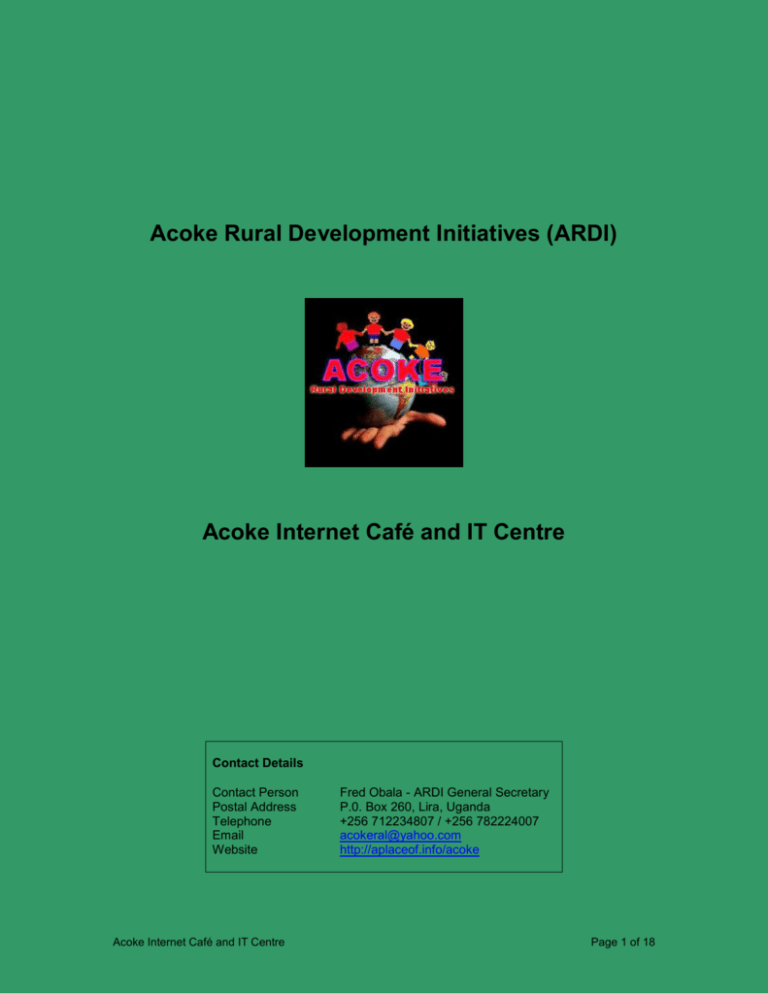
Acoke Rural Development Initiatives (ARDI) Acoke Internet Café and IT Centre Contact Details Contact Person Postal Address Telephone Email Website Acoke Internet Café and IT Centre Fred Obala - ARDI General Secretary P.0. Box 260, Lira, Uganda +256 712234807 / +256 782224007 acokeral@yahoo.com http://aplaceof.info/acoke Page 1 of 18 Contents 1 2 3 Executive Summary ................................................................................................................ 3 Background Information .......................................................................................................... 4 The Organisation - Acoke Rural Development Initiatives (ARDI) ........................................... 4 3.1 Legal Status ................................................................................................................... 4 3.2 History and Purpose ....................................................................................................... 4 3.3 Vision .............................................................................................................................. 5 3.4 Values ............................................................................................................................ 5 3.5 Target Groups ................................................................................................................ 5 3.6 Membership and Officers ............................................................................................... 5 3.7 Partnerships ................................................................................................................... 7 3.8 Main Areas of work......................................................................................................... 7 3.9 Projects .......................................................................................................................... 7 3.9.1 Current Projects ..................................................................................................... 7 3.9.2 Future Projects ...................................................................................................... 8 4 The Project - Acoke Internet Cafe and IT Centre ................................................................... 8 4.1 Reason for the Project ................................................................................................... 8 4.2 Goals and Objectives ..................................................................................................... 9 5 Market Overview ..................................................................................................................... 9 5.1 The Customers ............................................................................................................... 9 5.2 Level of Market Development ........................................................................................ 9 5.3 Industry Overview........................................................................................................... 9 6 Products and Services .......................................................................................................... 10 6.1 Service Description ...................................................................................................... 10 6.2 Competitive Advantages .............................................................................................. 10 6.3 Pricing Structure ........................................................................................................... 10 7 Marketing Plan ...................................................................................................................... 11 7.1 Marketing Strategy ....................................................................................................... 11 7.2 Market Size .................................................................................................................. 12 7.3 Market Segmentation ................................................................................................... 12 7.4 Customer Satisfaction .................................................................................................. 13 8 Start Up Plan ......................................................................................................................... 13 8.1 Equipment .................................................................................................................... 13 8.2 Time Frame .................................................................................................................. 14 9 Operational Plan ................................................................................................................... 14 9.1 Location ........................................................................................................................ 14 9.2 Business Hours ............................................................................................................ 14 9.3 Legal Environment ....................................................................................................... 15 9.4 Personnel ..................................................................................................................... 15 9.5 Management and Organisation .................................................................................... 15 10 Financial Plan ................................................................................................................... 16 10.1 Income Projection......................................................................................................... 16 10.2 Recurrent Costs ........................................................................................................... 16 10.3 Start Up Expenses and Capitalisation ......................................................................... 17 10.4 Total Funding Required ................................................................................................ 17 11 Future Plans ..................................................................................................................... 18 Acoke Internet Café and IT Centre Page 2 of 18 1 Executive Summary Twenty years of war in northern Uganda have had a devastating affect on the population. Many people are living in poverty with little hope for the future, and many children have received no, or very little, education. Acoke Rural Development Initiatives (ARDI) is a registered Community Based Organisation working in the Lira district of Uganda to help people affected by the war to rebuild their lives and regain their independence. Computer literacy and Internet access are becoming an essential part of life in Uganda, providing access to information and to increased employment and education opportunities. To meet this need, ARDI have decided to set up a computer-training centre and Internet café to serve the population of Lira town and surrounding areas. The centre will be called the Acoke Internet Cafe and IT Centre This centre will provide the local population with the following services: 1: Computer Training 2: Access to the Internet 3: Secretarial Services As well as providing affordable and reliable computer access and training to the general population, the centre will provide free basic computer and internet training to selected unemployed young people to make them better able to get jobs or to move on into further education. The centre will also generate income, which will be used by ARDI to fund some of its other activities. These include setting up a small grain mill, which will enable local maize growers to process and sell their crops, and expanding a small dairy farm which the organisation runs within the local community. This document has been prepared to obtain donations of suitable computers and funding of approximately US$9700 to cover the initial start up costs and the first one-month of operation. Acoke Internet Café and IT Centre Page 3 of 18 2 Background Information Lira district is in the northern region of Uganda, 347 kms from Kampala, the capital city. According to the 2002 census it has a population of 757,763 people. The largest town in the district is Lira town with a population of about 40,000. The area is largely rural with little access to electricity or other services except in Lira town. Most people depend on agriculture or animal keeping making a living. Income levels are still very low, with average per capita income standing at Ush 170,000 (about US$95) per annum. 53% of households live below the relative poverty line. 33% of households live in absolute poverty Over the last twenty years the area, as with the whole northern region of the country, has been affected by the war with the Lord’s Resistance Army (LRA). Across the north as a whole, it is estimated that 12,000 people were killed during the war, and nearly two million were forced to leave their homes and move into Internally Displaced Persons (IDP) camps for their own safety. Up to 30,000 children were abducted by the LRA and many of these were forced to become child soldiers or sex slaves. Now the fighting has stopped and the majority of people in Lira district have been able to return to their homes. However people have been left traumatised by their experiences and many children have lost one of both of their parents. The area has also been badly affected by the HIV/AIDS epidemic that is sweeping Africa. Because of the high levels of poverty in the area a large number of people are dependent on external aid agencies for the basic needs of survival like food and healthcare and have little hope for the future. Because of the displacement during the war children have received little or no education, which means they have few opportunities for gaining employment or moving on to further studies. It is against this background that ARDI are working to improve the lives of people in the area and assisting them in gaining the skills and opportunities to build a better future for them. 3 The Organisation - Acoke Rural Development Initiatives (ARDI) Acoke Internet Cafe and IT Centre will be owned and operated by Acoke Rural Development Initiatives (ARDI). More detailed information on the organisation can be found at http://aplaceof.info/acoke 3.1 Legal Status ARDI is a recognised Community Based Organisation (CBO). It was registered on 14 December 2004, registration number L/12/04/509, to operate within Lira district. It is registered under the provision of the Non Governmental Organisation Registration statute 1989, Regulations 1990 and the Local Government Act 1997 and amendment 2001 3.2 History and Purpose Three young people in Anai-Olaka village that is In Anai parish, Lira Sub-county, founded ARDI in 2004 about 4.5 kms from Lira town. Acoke Internet Café and IT Centre Page 4 of 18 It is a youth-led organisation committed to assisting the young people in the area to recover from the effects of war and to give them hope for, and control over, their own future. It focuses on getting young people directly involved in projects to give them the confidence and skills to move on with their lives and become productive members of society. It currently works within Lira district and hopes to expand its operations to other areas of northern and eastern Uganda over time 3.3 Vision The organisation envisions young people affected by war taking the lead role in youth development locally and internationally to rebuild hope for the future 3.4 Values To be able to realise its goals and objectives the organisation affirms to the following values and principles: 3.5 Transparency & accountability Equality Partnership & Participation Children and Youth first Tolerance & solidarity Open door policy Target Groups The organisation specifically targets vulnerable children, youth and mothers between the ages of 12 -35 of both genders. It also involves policy makers, parents, teachers and the community as a whole. 3.6 Membership and Officers ARDI has about 60 members and is aiming to increase this. It is owned by the Board of Trustees (BOT), which represents the entire community of Anai. The board of trustees is accountable to the community members. The member’s of ARDI come from Anai parish and surrounding areas. These members form the general assembly that meets annually in general meetings (AGMs) to deliberate on issues of the previous year and devise plans for the following year. The following officers were elected in 2006 to serve a two-year term: 1. Odongo JB - Chairperson Odongo JB was born in Lira and went to Amintenyo primary school and Fatima College. He worked as a teacher from 1980-1990. From 1990-1996 he worked as an Agricultural field officer in Otuke County. While there he set up fishpond, goat rearing, organic farming and Shea nut oil project projects, among others, all of which have been successful. In 1997-1998 he was parish chief of Olarokwon and from 1999-to date he has been the Sub-County chief Adwari sub-county. Under his leadership many schools and Acoke Internet Café and IT Centre Page 5 of 18 health centres have been built and many small community based projects have been initiated in the villages. 2. Obala Fred - General Secretary and Nabuur Local Representative: Obala Fred was born on 22nd June 1982 and was brought up in a small poor family. He attended Lomukura primary school then Sam Iga Memorial College secondary school in Kampala. He studied Higher Certificate in Marketing and Business Management and Introduction to Computers at Manganjo Institute of Career Education, followed by a Diploma In Marketing and Business Management at Young Men Christian College. Today Fred is perusing a course in Computer Networking at Makerere University in Kampala. Once the computer centre is successfully up and running he hopes to enrol for a Degree course in Information Technology at Makerere University Kampala. In 2004 Fred registered ARDI with NABUUR.COM to gain the support of online volunteers to assist with projects. He also works as a volunteer training the leaders (Local Representatives) of the other Ugandan communities on Nabuur. He is the Executive Director of Uganda Millennium Communities for Integrated Development (UMCID) 4 5 6 Akao Josephine - Treasurer Akello Betty - Women’s Representative Ocen George - Technical Advisor Acoke Internet Café and IT Centre Page 6 of 18 6.1 Partnerships ARDI is currently a member of the following networks within Uganda that enables it to share information with, and gain assistance from, other Ugandan organisations: Uganda National NGO Forum, National Agricultural Advisory Services (NAADS), DENIVA, and Civil Society Organisations for Peace in Northern Uganda (CSOPNU) It has also linked up with NABUUR.COM, a Netherlands-registered foundation which runs a website that puts communities in developing countries in touch with online volunteers from all over the world. The volunteers are assisting with the computer centre project by providing skills and contacts. 6.2 Main Areas of work ARDI focuses on the following main areas 6.3 Famine Education Poverty Environmental Degradation Adult Illiteracy Gender inequalities Lobbying and Advocacy IT skills and Information Dissemination Agricultural Show and Trade Fair participation. Immunisation and malaria Control Projects ARDI’s programs are unique and innovative initiatives that take into account the Millennium Development Goals (MDGs), which are integrated in its work with young people. The projects help young people to help themselves by working with them to gain new skills and sources of income. 6.3.1 Current Projects There are currently five main programme areas: 1. Youth Talent Showcase and Untold Stories ARDI holds a monthly talent extravaganza that showcases youth talents through different categories including music, modelling, fashion, drama, poems and public speaking. They put on shows to educate the community about important issues such as gender-based violence, and have had a positive impact on behaviour. They also put on drama events to raise income for their other projects. As well as educating the local community these events help the participants to increase confidence in their ability to speak out in public, and gives them the opportunity to tell others about their lives. 2. Acoke Mini Ranch Scheme In November 2006 ARDI set up a small dairy farm that currently has five cows and two bulls and is hoping to expand. The income raised from the sale of milk etc will be used to expand the farm and pay school fees for children who are unable to afford to attend school. Acoke Internet Café and IT Centre Page 7 of 18 Over the longer term it is intended that the farm will become a demonstration site that will assist in educating other local farmers in improved production techniques. 3. NAADS ARDI has registered with National Agricultural Advisory Services (NAADS) to be one of the service providers in the field of Agriculture to local farmers at the village level up to 2008. 4. Acoke Internet Cafe and IT Centre ARDI are working to set up an Internet café and computer training centre, as described in this document 6.3.2 Future Projects 1. Grain Mill Using income generated from the computer centre, ARDI are intending to set up a small grain mill. This will enable local maize growers to process and package their crops, meaning that they will be able to market them more effectively, generating a greater income for their families. 7 The Project - Acoke Internet Cafe and IT Centre 7.1 Reason for the Project Computers are becoming an essential part of life in Lira, as in Uganda as a whole. However there is a low level of computer literacy in the area. This is due to the lack of computer education in schools, which often have no electricity and phone services, and the fact that people cannot afford to buy machines of their own. Increasing the level of computer literacy will enable people to obtain better access to information and to greater employment and education opportunities. These are greatly needed due to the high level of poverty and unemployment in the area. Although there are already four Internet cafes in Lira town, none of them offer computer training, meaning that customers have to rely on limited assistance from café staff. Others would like to use computers but do not feel comfortable asking staff for help. Many people from these two groups would like to receive training so that they can use computer and Internet services independently. To meet this need, ARDI have decided to set up a computer-training centre and Internet café to serve the population of Lira town and surrounding areas. The centre will be called the Acoke Internet Cafe and IT Centre. There are many young people in the area who don’t have jobs so are unable to afford to pay for training. ARDI will identify these people and offer them free training. Initially they will provide free training to 10 young people at a time, but aim to increase the numbers once the centre is generating sufficient income. ARDI also requires income for other projects within the local community, such as setting up the grain mill, but external funding can be hard to find. As well as maintaining and expanding the centre, income from the Internet café and paid-for training will be used to start up these other projects. This is a central part of the way ARDI works – income from one project goes to start another project, which generates more income that is used to start another, and so on, providing real long-term benefit to many different groups within the community. Acoke Internet Café and IT Centre Page 8 of 18 7.2 Goals and Objectives To provide Internet access and computer training to people in Lira at a reasonable price and to use the income generated to benefit the local community. Objectives 1. ARDI plans to capture market share of Lira Internet café market by increasing usage of Internet services. 2. To provide access to information through the internet 3. To provide access to printing, scanning, photocopying, fax and other business services 4. To provide free basic computer training for vulnerable youth to equip them with skills which will enable them to gain employment or move into further education. 5. To provide computer training to the general population to increase computer literacy levels 6. To generate income for implementing other desired projects/activities that will improve the lives of people within the local community e.g. the grain mill 8 Market Overview 8.1 The Customers The main consumers are people who have achieved basic education and can read and write English. These are spread across the student, working class and business community. 8.2 Level of Market Development People are just beginning to utilise the existing ICT facilities in Lira and Uganda as a whole. The main constraint being faced is computer illiteracy. The other major constraint is the relatively high cost of accessing ICT services in the third world. The high cost of Internet connection by service providers’ forces Internet cafes to charge relatively high costs to cover their operating expenses and to make a profit. As more Internet service providers come to market more people are expected to use the Internet that will lead to a rise in computer literacy among the general population. 8.3 Industry Overview Information and communications technology (ICT) is an infant but growing industry in Lira, Uganda, just like in most third world countries. The most notable thing about it is the fast rate of growth. Trends indicate large inflows of used computers from the first world being distributed mainly to institutions of learning, non-governmental organisations, and private businesses. The main reason for this growth is that the Internet has proved to be the cheapest and most effective method of long distance communication and a useful source of information. It has also been prompted by, among others, tax waivers by the government on ICT product imports. Adding to the above, government policy on education further encourages the use of computers and Internet services for students in primary, secondary and tertiary institutions. The growing business sector also presents a vast opportunity for future market expansion. The current Internet service coverage includes mainly the urban areas where electricity supply is available. This factor among others limits most rural based schools in getting Internet access. Acoke Internet Café and IT Centre Page 9 of 18 The ICT sector in Lira town is fast paced in terms of growth and expansion. The number of Internet service providers is on the increase by the month. There is therefore a growing level of competition in the Internet service market. 9 Products and Services 9.1 Service Description The centre will provide the following primary services: Internet and business: Internet Access Printing Scanning Photocopying facilities Fax facilities Administrative and clerical services Training Basic computer skills Internet and email Common software packages e.g. Word, Excel As well as offering training to general computer users at market rates, the centre will train selected unemployed young people free of charge, initially starting by training 10 at a time but with the hope of expanding this in the future. This will give them more opportunities to gain employment or move on into further education. Additional services will be dependent on demand but may include: 9.2 Leasing/Renting the room as a venue for group forums, providing computer usage and Internet access. Competitive Advantages The key driving factors for the competitive advantage will be: 9.3 Competitive Pricing Superior service Pricing Structure Where possible the centre will aim to keep its prices lower than other cafes in the area, while ensuring that the prices still generate a reasonable profit. Initially, Internet access and training will be charged at a single rate. In the future, ARDI will look at the possibility of varying the rate of different times of the day/week to take account of demand. Acoke Internet Café and IT Centre Page 10 of 18 Having lower rates at times of lower demand will enable people on lower incomes to become computer literate. 10 Marketing Plan 10.1 Marketing Strategy Acoke internet café will choose the market segment that gives the most returns on investment and make promotional efforts in this area. Preliminary results indicate that the business community market segment has the most purchasing power but ironically is the most ignorant about internet use, many being computer illiterate. Basic training packages on Internet use (emailing, surfing, downloading and uploading etc) and basic computer packages such as Word and Excel will be attractive for this category of users. This will be the first centre in Lira to provide this service A survey done for one week at Provident café indicates that customers without basic computer skills frequently visit the Internet café and they are the ones who buy much longer hours each time they visit the cafe (super users). Skills Business men with basic skills Students with basic skills Working class with basic skills Those with no computer skills Day 1 5 Day 2 7 Day 3 6 Day 4 4 Day 5 14 Day 6 10 Day 7 11 13 16 16 9 6 18 10 14 10 7 9 13 15 17 17 11 8 15 12 16 10 This data was compiled on the 17th/August.2006: Source: Ogwal Boniface, café attendant at Provident Internet café, Lira. Bonus Allocation: Bonuses for minimum minutes/hours of Internet usage will be applied for serious users. From the market survey, the management of ARDI’s Internet café will identify those users/clients that utilise their services for relatively longer hours. Such users will then be motivated through a bonus programme (extra time given) designed by the management. Market Promotion: The centre will carry out promotional efforts in a bid to increase market share. This will include advertising on local radio, as this is the cheapest and most effective form of advertising in the area Training Potential Internet Users: Many potential clients do not know how to use the Internet, and believe that it is a complicated system of communication suitable for the highly educated only. Promotional efforts involving identification and training of potential users, e.g. Acoke Internet café personnel will carry out the business community, on Internet use at the café. Prepaid Services: In the future, prepaid services will be introduced for busy individuals, especially business people. This will involve downloading and printing information on behalf of the Acoke Internet Café and IT Centre Page 11 of 18 users who choose this option of utilising the services. The users will have to subscribe for this prepaid service, specify the type of information they wish to access, and authorise Internet personnel to operate on their behalf and bill their prepaid account. Personnel at the café, who will by then have had substantial experience of finding information on the internet, will then search for and download information for these clients. This is an innovative approach to encourage: 10.2 New users to get attracted and acquainted to internet use; Busy people who do not have time to search for information themselves; Incompetent/ignorant users to get acquainted with and increase usage of internet services; Market Size The main market is the population of Lira town that is approximately 40,000. From surveys done in two internet cafés in Lira (Provident café and White House café) on the percentage split of the potential users, it was found that roughly 30% are students, 31% are working class, and 39% are business class and others. In terms of revenue the cafés are getting the most income from working class followed by students. 10.3 Market Segmentation The market can be divided into the following groups 1. Local professionals These are individuals working for the local government (civil servants), local NGOs and faith based organisations (churches). 2. Local students The students are mainly primary and high school students and university students on holiday, who live in and around Lira town. 3. Foreign NGO employees These are employees of international NGOs based in Lira town. Although most of these have their own Internet access facilities installed in their office premises, they still visit private Internet cafes especially during weekends and after office hours. 4. Business Community: Lira town is the hub of a network of districts. The town itself has more than 5,000 businessmen (enterprises) operating at different levels of investment. Many businessmen from five neighbouring towns converge in Lira to purchase stock for their enterprises. Although a relatively small percentage of the business community currently utilise Internet facilities, they present attractive prospects for market development. It is imperative to note two critical factors about the business community. 1. The segment has the biggest potential for expansion of all market segments; 2. The segment has adequate purchasing power to pay for internet services Acoke Internet Café and IT Centre Page 12 of 18 10.4 Customer Satisfaction The centre will carry out regular customer satisfaction surveys to enable it to improve services and guide future business expansion. These surveys will help the centre to: 1. Understand current trends (demand and supply patterns) in this service sector. 2. Identify limitations facing specific market segments in utilising Internet services. 3. Guide development of appropriate strategies for market expansion/penetration. Tools used to conduct market research/market surveys will include: 1. Questionnaires; Clients will be asked to express their feelings (satisfaction or otherwise) in structured questionnaires, and make suggestions for improvements 2. Verbal Interviews with clients will be used to discuss issues pertaining to improved service delivery and market development/expansion. 3. Focus group discussions (FGDs) with current and potential users will be used to gauge the level of usage by each market segment. The results will then guide promotional and sales efforts. 4. Suggestion box will be available for anonymous deposit of letters; this is aimed at seeking clients’ opinion on ARDI’s services. 5. Compilation of statistical data on users-by-segment will be carried out to determine the segment generating the highest revenue. Special packages will then be provided for them. 11 Start Up Plan 11.1 Equipment To reduce costs, ARDI will seek donations of computers from one of the many international nonprofit organisations who provide them to projects in developing countries. Other equipment will be bought within Uganda to reduce shipping/transport costs As the electricity supply in Lira town is not reliable, the centre will purchase a generator so that it can operate at times when the mains supply is no available. Acoke Internet Café and IT Centre Page 13 of 18 11.2 Time Frame The exact timeframe will be dependant on when the centre receives funding. Once this funding is obtained, the estimated timeframe in months is as follows Initially the centre will open for Internet access only, with the training (both commercial and free) starting two months later. This will allow the staff some time to become used to running the centre without the added pressure of running training courses Activity Acquiring and transporting 9 computers Procuring set-up equipment Training volunteers Setting up the café, Installation and configuring Launching the new café Designing Computer Education curriculum Time frame (Months) 1 2 3 4 5 6 7 X X Logistic 8 9 10 11 12 Funds X X X X X X X Start commercial and free training programmes Monitoring and supervision Evaluation X X X X X X X X X X Report Funds Funds IT experts & funds Funds Volunteers and IT experts IT experts Manager Committee members Manager 12 Operational Plan 12.1 Location The centre will be located in the Town View Hotel building in Lira town. The hotel is at the main junction of Bala and Oyam road in the heart of the town. The location is in the town centre, in a commercial environment that is a hive of business activity. It is convenient for customers even at late hours, easily accessible, has an attractive appearance, is strategically located, and is adjacent to a fast food restaurant frequented by potential customers. There is available parking space. The building is accessible to landline telephone, from which the Internet will be connected, electricity and water utilities, with good sanitation services. The landlord maintains it. Rent will be 300,000 (177$) per 30 days 12.2 Business Hours The centre will be open from Monday to Saturday from 8:00am to 11pm Free training of the youth will be from 8:00am-10: 30am every day Sundays will be for trainees practice. Acoke Internet Café and IT Centre Page 14 of 18 12.3 Legal Environment To be able to operate the centre, ARDI will obtain the following legal documents 12.4 A license from the Uganda Revenue Authorities (URA) A certificate of trading from Lira municipal council Personnel One manager and three young members of ARDI will work at the centre and one manager. The four attendants will be trained at a local training institute prior to starting work. This will give them the skills required to run the Internet café and provide basic computer and Internet training they will be paid 47$ per month each. The manager will be a member of the ARDI committee and will work as a fulltime staff. There will be also be a local IT expert to oversee technical aspects and ensure the smooth running of the centre. He will not work full time at the centre but will be called on as and when needed. 12.5 Management and Organisation The centre will be owned and run by ARDI who will be in charge of all management decisions and monitoring. Manager - Roles and responsibilities 1. 2. 3. 4. 5. 6. 7. 8. 9. 10. Supervision Keeping proper records of sales Setting the prices of services and carrying out promotional activities Reporting to ARDI board. Compiling financial data and producing financial statements (periodically) Initiating new marketing strategies and approaches Banking sales and withdrawal of cash. Authorising and effecting payments and procurement of inventory. Managing the business services and marketing operations Creating new plans to develop the centre and lobbying for funding and other support Sales Executive/Trainer - Roles and responsibilities 1. 2. 3. 4. 5. 6. 7. 8. Daily running of the café. Handling customers queries and complaints Collecting data on accounts receivable for submission to manager Receiving cash for submission to manger. Making daily cash summary till sheet. Publishing the activities and services of the cafe. Training users Recruiting new trainees. Acoke Internet Café and IT Centre Page 15 of 18 IT Expert - Roles and responsibilities 1. 2. 3. 4. Handling technical matters in the café. Maintenance of the effective performance of the machines Controlling computer-training programs at the café. Advising the organisation on technical issues 13 Financial Plan Note: in all calculations, the exchange rate used is 1 US$ = 1700 Ugandan Shillings (UGX) The cost of Internet access at the centre will be lower than that at other centres in Lira. The following prices will be charged for services 1. 2. 3. 4. 5. 6. Internet access = 40 Ugx ($0.023) per minute Printing = 500 Ugx ($0.28) per page Photocopying = 50 Ugx ($0.028) per page Scanning = 1000 Ugx ($0.58) per page Training package = 36000 Ugx ($22) Secretarial and graphic designing prices are negotiable approx 5000 Ugx ($3) per ID card. 7. Faxing ranges from 3,000-10,000 Ugx ($1.67-5.6) 13.1 Income Projection Income projection per month based on the figures above: Source of income Printing Internet access Scanning Photocopying Faxing Training Secretarial services TOTAL INCOME PER MONTH 1.2 US$ 200 250 150 230 70 700 150 1,750 Recurrent Costs Item Internet connection Fuel for generator CDs, floppy, papers and ink Rent Paying four staff (80,000 x 4) Paying IT expert Training materials Maintenance and repairs Electricity Acoke Internet Café and IT Centre UGX per month 655,000 100,000 160,000 300,000 320,000 90,000 100,000 100,000 40,000 USD per month 385 59 95 177 188 53 56 59 24 Page 16 of 18 30,000 18 Advertising 1,893,800 1,114 TOTAL PER MONTH The recurrent costs will be funded for the first 1 month of operation therefore Total amount of funding required for recurrent costs = 1,893,800 UGX X 1 1,893,800 1,114 TOTAL FOR ONE MONTH 13.2 Start Up Expenses and Capitalisation Table of Capital cost (start up cost) have physical and IT infrastructures Item Quantity Computers (donation) Networking and configuring Terminal Receiver Repeater Router RJ 45 cables Air fan Scanner Printer Photocopier Fax machine Web cam camera Training four staff. Switch UPS Training licences Ethernet cables Landline phone connected Trading licences Antivirus software Time Management software Computer servicing Contingency Tables Chairs Electricity installation Head phones Generator Transporting equipments bought to the site (Kampala to lira) TOTAL 13.3 9 1 1 1 1 30 4 1 1 1 1 8 4 2 4 1 200mt 1 1yr 9 1 10 20 1 9 1 1 Unit Cost UGX 0 400,000 700,000 400,000 700,000 1,000 60,000 200,000 200,000 1,600,000 500,000 50,000 360,000 300,000 120,000 200,000 2,000 240,000 150,000 300,000 300,000 400,000 500,000 40,000 35,000 700,000 50,000 1,500,000 800,000 Total Cost UGX 0 400,000 700,000 400,000 700,000 30,000 240,000 200,000 200,000 1,600,000 500,000 400,000 1,440,000 600,000 480,000 200,000 400,000 240,000 150,000 300,000 300,000 400,000 500,000 400,000 700,000 700,000 450,000 1,500,000 800,000 Total Cost US$ 0 236 412 236 412 18 142 118 118 942 295 236 847 353 283 118 236 142 89 177 177 236 295 236 389 389 265 883 471 14,430,000 8,489 Total Funding Required Item Start Up Expenses Acoke Internet Café and IT Centre UGX 14,430,000 US$ 8,489 Page 17 of 18 Recurrent costs for one month TOTAL FUNDING REQUIRED 1,893,800 16,323,800 1,114 9603 Back-up plan/Sustainability plan. The local community have taken into consideration the sustainability or back-up plan of this internet centre by already identifying some possible income generating activities that would help to raise money from another source to sustain this within the kick off period or infantry stage incase the centre is not yet fetching enough customers to meet the recurrent cost. Brick making is one of the activities identified by the local community as the means of raising funds. When community makes their bricks and sell it to the local constructors within lira town or beyond and this activity would no external support to start it meaning we can do it well within our local efforts here at Anai Olando trading centre near lira town. More activities of this kind are still to be surveyed if it can serve the purpose of raising the income required for this centre recurrent cost. 14 Future Plans Using income generated from the computer centre, ARDI are intending to set up a small grain mill. This will enable local maize growers to process and package their crops, meaning that they will be able to market them more effectively, generating more income for their families As very few local schools have computers, the centre will investigate the possibility of providing basic computer education to children during school holidays. Over time it is hoped that the centre will expand to provide a greater range of training courses, and increase the amount of free training provided to needy young people. It will also increase the number of business and design services it offers to include items such as designing of documents, certificates, Identity cards, binding and sealing. In both cases, exact details will depend on the level of demand and income available to fund the expansion. . As ARDI continues to expand its operations to other areas of Lira district and beyond, the centre will be used as a model for setting up similar centres in other towns, providing computer training and internet access in places where there is currently none, and generating income for ARDI’s projects in those areas. Acoke Internet Café and IT Centre Page 18 of 18

